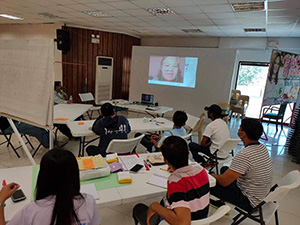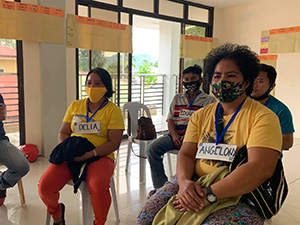 Virtual focus group discussions (FGDs), is now the new normal as shown by the Biotechnology project of the Philippine Council for Agriculture, Aquatic and Natural Resources Research and Development of the Department of Science and Technology (DOST-PCAARRD).
Virtual focus group discussions (FGDs), is now the new normal as shown by the Biotechnology project of the Philippine Council for Agriculture, Aquatic and Natural Resources Research and Development of the Department of Science and Technology (DOST-PCAARRD).
The FGDs were conducted with farmers from Nueva Ecija, Pangasinan, Isabela, and Bukidnon to validate impacts of policies on the production of genetically modified (GM) corn and Bacillus thuringiensis (Bt) eggplant.
The PCAARRD project team was one of the first to adopt changes in conducting FGDs, which were conducted from June 15 to July 31, 2020. The series of FGDs is part of the project, “A Review of Policies on Crop Biotechnology: Impacts on Food Security and Agricultural Developments in the Climate Change Era.”
Considering the COVID-19 situation in the country, changes to the conduct of research activities, particularly on communicating with far-off communities, are required to further progress projects with safety in mind.
In the past, it is customary to travel to a destination and meet with the Municipal Agricultural Officers (MAOs) and Coordinators to conduct FGDs, but considering COVID-19 pandemic safety measures, online FGDs were favored instead.
The initial plan was to coordinate with MAOs from 15 municipalities in Nueva Ecija, Pangasinan, Isabela and Bukidnon and travel to those destinations to conduct the FGDs but the declaration of an Enhanced Community Quarantine (ECQ) on March 16, 2020 led to the cessation of transportation services. After the cancellation of travels, revisions to FGD guidelines led to a big reliance on online and cellular communication methods.
 Training for MAOs ran between June and July. Of the 15 MAOs, two were unable to proceed with training citing security on top of connectivity and scheduling issues. Online training was done using either Facebook Messenger, Google Meet, or Zoom; whichever was more convenient for the MAOs. The number of farmers/respondents per FGD were reduced from around 15 to just 6, reducing the risk of crowding, thereby abiding community quarantine protocols. The selection of farmers was done by the MAOs, who were instructed to select three GMO and 3 non-GMO corn farmers.
Training for MAOs ran between June and July. Of the 15 MAOs, two were unable to proceed with training citing security on top of connectivity and scheduling issues. Online training was done using either Facebook Messenger, Google Meet, or Zoom; whichever was more convenient for the MAOs. The number of farmers/respondents per FGD were reduced from around 15 to just 6, reducing the risk of crowding, thereby abiding community quarantine protocols. The selection of farmers was done by the MAOs, who were instructed to select three GMO and 3 non-GMO corn farmers.
Visual FGD materials consisting of manila papers and meta cards were prepared by the project team and were sent to the agriculture offices via couriers. Package delays did occur but were eventually resolved. After accomplishing the training and receiving the materials, the MAOs were ready to conduct the online FGDs with the project team.
Each online FGD started with the setup, which took about 30 minutes – establishment of a connection and setup of the FGD materials. A camera was placed to provide a visual of the FGD materials to MAOs, and the farmers. Each online FGD ran for about 3 hours.
Connection issues were the most prevalent challenge which resulted FGDs to start or end late. Slow connections that result in poor picture quality also affect communication. These issues are one of many to be considered especially in remote places.
While the present conditions hinder the conventional way of performing meetings, alternative ways of doing so are present even if they might not be a flawless replacement. With the increasing concern against public health and safety, reliance on digital platforms would be highly likely.
